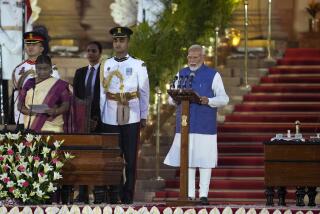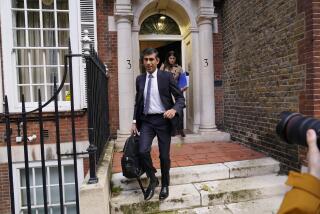Gandhi Selects Economist to Be New Prime Minister
- Share via
NEW DELHI — Manmohan Singh is set to become India’s prime minister after the country’s president confirmed Wednesday that the soft-spoken and frugal economist had been asked to form the next government.
“I feel humble that the nation has given me this mandate,” Singh, 71, said outside the president’s official residence.
A date for the inauguration will be set later, he said.
Italian-born Sonia Gandhi, who decided not to become prime minister despite leading an alliance of parties to victory in elections that ended last Thursday, stood at Singh’s side, smiling broadly and looking relieved.
“I have been under tremendous pressure from my colleagues, my party workers, and many, many people throughout the country,” she said. “Naturally, being under such pressure sort of takes you down a bit.
“But now that everything is over, I am very happy,” she added. “I think our country will be safe in Dr. Manmohan Singh’s hands.”
Gandhi, 57, is the widow of former Prime Minister Rajiv Gandhi. Friday marks the 13th anniversary of his assassination.
As hundreds of dejected pro-Gandhi demonstrators continued Wednesday evening to demand that she become prime minister, members of Parliament from her Congress Party endorsed Singh as their candidate for the job.
Singh and Gandhi then met President A.P.J. Kalam for the second day in a row, this time to say their United Progressive Alliance was prepared to form a government with Singh as its prime minister.
Gandhi, who became an Indian citizen in 1984, was her party’s first choice for prime minister. But she suddenly backed out Tuesday under a relentless attack by Hindu nationalists, who argued that she is a foreigner unfit to govern the world’s largest democracy.
Several Congress Party leaders offered their resignations Wednesday in a final, desperate effort to persuade Gandhi to change her mind and become prime minister. She refused.
Although Gandhi is no longer parliamentary leader of her alliance, she remains president of the Congress Party, which will head the new coalition government. In a statement to party workers Wednesday, she promised to remain active in politics.
Singh, who will be India’s first Sikh prime minister, was Gandhi’s choice for the job. He is an internationally respected economist, and was the architect of India’s economic reforms as finance minister in the early 1990s. He has a master’s and doctorate from Oxford University and has worked for various United Nations agencies. A public servant since 1971, he is a former head of the nation’s central bank.
What’s unclear is whether he will be able to keep a coalition government together while fending off attacks from the same Hindu nationalists who brought Gandhi down.
Singh has never won a seat in India’s lower house of Parliament, called the Lok Sabha, or House of the People. Instead, the state legislature in the small northeastern state of Assam chose him to sit in the weaker upper house, called the Rajya Sabha, or Council of States.
People who have known and worked with Singh for more than a decade describe him as a sort of anti-politician, a quiet, hardworking man and a deep thinker who shuns the perks and corruption that many Indian politicians thrive on.
“He is honest to the core,” deputy commissioner A.K. Absar Hazarika said from Assam’s state capital, Guwahati. “In all the [five] years that he was finance minister of India, he never drew any salary.
“He is a very simple man. He doesn’t own any flashy cars, he doesn’t own any buildings -- nothing. I don’t think there is any quality that the opposition can really exploit.”
Singh is also calm in a crisis, Hazarika said: “In the 10 1/2 years that I have known him, I’ve never heard him speaking harshly to anybody.”
Singh insists on flying coach and staying in cheap government motels called circuit houses when he travels, said H.B. Sharma, minister of state for planning and development in Assam.
He said Singh also pays by check whenever possible to make sure government money isn’t misused.
As a youth, Singh was one of the millions of “partition refugees” who fled their homes in 1947 across the new border to escape the bloodletting that erupted when Britain granted the subcontinent independence, and carved out Pakistan as a separate state for Muslims.
Pakistani President Pervez Musharraf is also a partition refugee, who escaped with his family from Old Delhi.
The two South Asian leaders will face difficult compromises during landmark peace talks set to begin in the coming days. Their similar backgrounds may improve the atmosphere, and the chances of a deal, if the talks reach a deadlock that only Singh and Musharraf can break.
More to Read
Sign up for Essential California
The most important California stories and recommendations in your inbox every morning.
You may occasionally receive promotional content from the Los Angeles Times.










